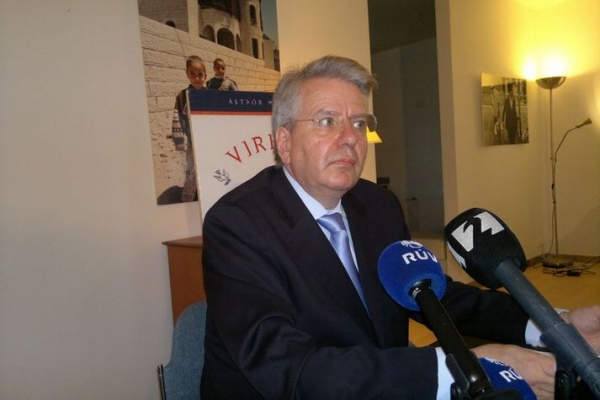The nationalistic right-wing populist party The Icelandic National Front has been charged with election fraud in the upcoming parliamentary elections. The party withdrew all it's party slates on Friday and will not run in the elections. Yesterday the National Election Commission has referred the case to the police.
Keeping fringe candidates or parties off ballot
Before getting on the ballot political parties fielding candidates in elections must include a petition signed by 300-400 voters in each district the party intends to field candidates. Signing these forms is in no way binding, it only means the signatory supports the party's bid to participate in the election. However, Icelandic voters rarely sign petitions for parties they disagree with or oppose.
While almost all candidates or parties are able to find the necessary 300-400 voters to support their right to run for office, the system can help keep the most objectionable fringe candidates or parties from cluttering the political field even further.
In-person election fraud virtually unknown

The election commissions in each of the four districts the National Front had intended to run determined that a significant part of the signatures turned in by the party had been forged. When the signatories on the paperwork filed by the National Front were contacted a large number denied ever having signed up for support of the party participating in the election. The Icelandic National Broadcasting Service reports that the National Election Commission determined all the petitions handed in by the party contained forged signatures.
The party leadership has blamed the forgeries on volunteers who were working for the campaign.
In-person election fraud or tampering with votes is virtually unknown in recent Icelandic political history. However, this is not the first time voter petitions have been referred to the police. In 2012 Ástþór Magnússon, an eccentric activist and businessman who had run in every presidential election since 1996, never capturing more than a few percentage points of the vote, was charged with having turned in forged supporter signatures. The case was ultimately dropped.
Second failed run by the party

The Icelandic National Front was founded in 2016 as a far-right nationalistic party. The party's platform included a fierce opposition to the EU stricter border controls and a ban on mosques. The party had intended to run in the 2016 parliamentary elections, but withdrew it's party slates in Reykjavík after internal arguments over the party's finances. The party received only 0.2% of the vote.
The large number of forged signatures on the petitions turned in by the party suggests the party's volunteers had trouble finding even the few hundred people needed for the party to get on the ballot.
A second right-wing populist party, the People's Party was founded earlier this year. The People's Party's founder and leader, Inga Sæland, has attempted to distance the party from the xenophobia and rapid nationalism of the National Front, emphasizing instead economic populism. This second populist party has been doing quite well in the polls, polling at 5-10% of the total.
The nationalistic right-wing populist party The Icelandic National Front has been charged with election fraud in the upcoming parliamentary elections. The party withdrew all it's party slates on Friday and will not run in the elections. Yesterday the National Election Commission has referred the case to the police.
Keeping fringe candidates or parties off ballot
Before getting on the ballot political parties fielding candidates in elections must include a petition signed by 300-400 voters in each district the party intends to field candidates. Signing these forms is in no way binding, it only means the signatory supports the party's bid to participate in the election. However, Icelandic voters rarely sign petitions for parties they disagree with or oppose.
While almost all candidates or parties are able to find the necessary 300-400 voters to support their right to run for office, the system can help keep the most objectionable fringe candidates or parties from cluttering the political field even further.
In-person election fraud virtually unknown

The election commissions in each of the four districts the National Front had intended to run determined that a significant part of the signatures turned in by the party had been forged. When the signatories on the paperwork filed by the National Front were contacted a large number denied ever having signed up for support of the party participating in the election. The Icelandic National Broadcasting Service reports that the National Election Commission determined all the petitions handed in by the party contained forged signatures.
The party leadership has blamed the forgeries on volunteers who were working for the campaign.
In-person election fraud or tampering with votes is virtually unknown in recent Icelandic political history. However, this is not the first time voter petitions have been referred to the police. In 2012 Ástþór Magnússon, an eccentric activist and businessman who had run in every presidential election since 1996, never capturing more than a few percentage points of the vote, was charged with having turned in forged supporter signatures. The case was ultimately dropped.
Second failed run by the party

The Icelandic National Front was founded in 2016 as a far-right nationalistic party. The party's platform included a fierce opposition to the EU stricter border controls and a ban on mosques. The party had intended to run in the 2016 parliamentary elections, but withdrew it's party slates in Reykjavík after internal arguments over the party's finances. The party received only 0.2% of the vote.
The large number of forged signatures on the petitions turned in by the party suggests the party's volunteers had trouble finding even the few hundred people needed for the party to get on the ballot.
A second right-wing populist party, the People's Party was founded earlier this year. The People's Party's founder and leader, Inga Sæland, has attempted to distance the party from the xenophobia and rapid nationalism of the National Front, emphasizing instead economic populism. This second populist party has been doing quite well in the polls, polling at 5-10% of the total.







